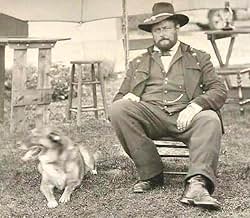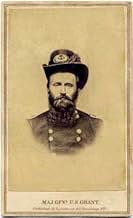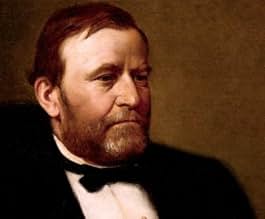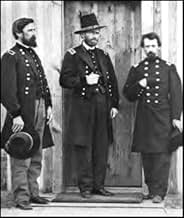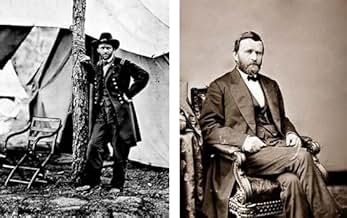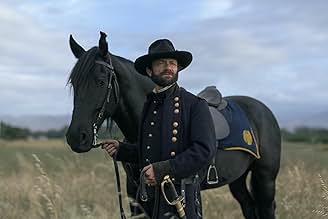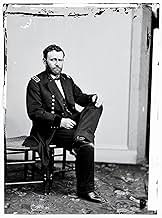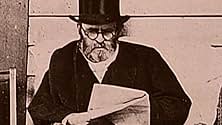Ulysses S. Grant: Vom Kriegsheld zum US-Präsidenten
Originaltitel: Grant
IMDb-BEWERTUNG
8,4/10
2497
IHRE BEWERTUNG
Die Dokumentarfilmreihe untersucht Grants Lebensgeschichte aus seiner Perspektive und mit seinen Erfahrungen, um eine turbulente Zeit in der Geschichte zu erkunden: den Bürgerkrieg und den W... Alles lesenDie Dokumentarfilmreihe untersucht Grants Lebensgeschichte aus seiner Perspektive und mit seinen Erfahrungen, um eine turbulente Zeit in der Geschichte zu erkunden: den Bürgerkrieg und den Wiederaufbau.Die Dokumentarfilmreihe untersucht Grants Lebensgeschichte aus seiner Perspektive und mit seinen Erfahrungen, um eine turbulente Zeit in der Geschichte zu erkunden: den Bürgerkrieg und den Wiederaufbau.
Folgen durchsuchen
Empfohlene Bewertungen
This documentary was always going to stand or fall on the portrayal of Grant and credit must be given to the Casting Directors Suzanne Smith & Bonnie Rodini for casting the criminally underused JUSTIN SALINGER. While Salinger might not be the perfect lookalike, it was clearly far more important to cast an actor capable of playing the many subtle nuances and complexities of the man and Salinger does a superb job here with his performance of Grant and I felt he was closer to the man than anyone to have portrayed him previously. While praising the actors, I am also going to single out the young man who played the Union private in the first episodes excellent opening sequence, ARTHUR FALKO - Again, extremely good casting, it was as if this one individual was wearing the entire history of the war on his face in those opening moments. Anticipation, fear, dread and later bravery and valour. I expect to be seeing a great deal more of him on our screens in future.
The series format jumps from documentary commentary and anecdotes from various historians and it was nice to see dialogue offered from both a male and female black historian on the man and the conflict in which he fought. This was a war over which the issue of slavery was key, so it felt quite right too and made this aspect of the series, far more interesting to watch than just having the usual older generation historian faces chipping in their valulable, but rather well worn comments.
The most engrossing segments of the show however are the dramatic segments and it was these and Salingers performance that kept me engaged in the show.
While I would have perferred to see a straight up drama mini series about the man without any of the historical commentary, this never the less is an extremely well made piece covering the life and motivations of one of the most equally loved and hated Commanders of the Civil War. I found it both educational and enligtening. Despite the more restrictive budget for a peroid piece the drama scenes are extremely well handled and critism by armchair historians about drill and uniforms are poorly founded. The uniforms are authentic, the drill of the early Union army appropriately poor in the early episodes, as was the army's state at this time. People need to remember, just because you read something in a book, doesn't make it a verbatim mode of action for every individual. War is complex, conscripted soldiers are not veterans, nor at first a professional army. It would be some time before the Union became one.
It would be great to see more in the series in a similar fashion. This was very enjoyable and I hope will engage a younger audience in the subject. That is the most important thing of all. The youth are, after all, the best hope for keeping history alive in the future.
The series format jumps from documentary commentary and anecdotes from various historians and it was nice to see dialogue offered from both a male and female black historian on the man and the conflict in which he fought. This was a war over which the issue of slavery was key, so it felt quite right too and made this aspect of the series, far more interesting to watch than just having the usual older generation historian faces chipping in their valulable, but rather well worn comments.
The most engrossing segments of the show however are the dramatic segments and it was these and Salingers performance that kept me engaged in the show.
While I would have perferred to see a straight up drama mini series about the man without any of the historical commentary, this never the less is an extremely well made piece covering the life and motivations of one of the most equally loved and hated Commanders of the Civil War. I found it both educational and enligtening. Despite the more restrictive budget for a peroid piece the drama scenes are extremely well handled and critism by armchair historians about drill and uniforms are poorly founded. The uniforms are authentic, the drill of the early Union army appropriately poor in the early episodes, as was the army's state at this time. People need to remember, just because you read something in a book, doesn't make it a verbatim mode of action for every individual. War is complex, conscripted soldiers are not veterans, nor at first a professional army. It would be some time before the Union became one.
It would be great to see more in the series in a similar fashion. This was very enjoyable and I hope will engage a younger audience in the subject. That is the most important thing of all. The youth are, after all, the best hope for keeping history alive in the future.
The six hour miniseries is best taped, so one can zip past all of the commercials, and learn about Ulysses S. Grant and his role in American history and how he won the Civil War and presided over Reconstruction, an experiment in democracy that went badly wrong. It is not hard to imagine that had Lincoln not been assassinated, history might have turned out much differently with Grant playing a more winning hand than he was dealt. The series pulls no punches in dramatizing just what a horror the Civil War was and the tremendous losses on both sides. When Grant successfully participates in the Mexican American War of 1848, alongside other officers who would soon work for him and against hime, his career seems on an upward trajectory, but he get sidelined into an obscure post in Fort Humboldt California with nothing to do, and he becomes melancholy, and turns to drinking, which forces his commanding officer to force Grant to resign. He returns to civilian life and does poorly, until the Civil War breaks out and he is given a commission once again to lead a regiment as a brigadier general. From there it is mostly one successful battle at a time, until he is promoted to major general and given command of all of the western army. From there he successfully launched a successful attack in the heart of the south at Vicksburg, with some of the most brilliant strategic maneuvers in the history of armed warfare. For that he gets promoted to three star general and put in command of the entire Union Army. Aside from a couple of notable failures, one a major defeat at Cold Water Virginia, Grant eventually corner's Lee's Army of Northern Virginia while General Sherman takes Atlanta, thus forcing a surrender at Appomatic. A major triumph is followed one week later by the assassination of Lincoln and history makes a major course correction. Andrew Johnson is a southern sympathizer and thwarts every attempt by Grant to take control over southern whites who are slaughtering freed slaves. Not until Grant becomes president, can he put a stop to this and put down the KKK. Grant as president though, because of his lack of guile, is undermined by subordinates who are corrupt, and America is by now tired of the reconstruction efforts in the south. When Grant leaves office, the KKK is on the rise again and reconstruction is basically a failure which has lasting repercussions to this day. Grant's image is later tarnished by southern historians who attempt to rewrite the history of the Civil War by painting it as a states rights issue and not about slavery. Grant comes accross as a villain. This miniseries tries to put this story right and to a large extent it succeeds. Grant is one of those great leaders who is about as straightforward as they come. His only apparent weakness is in sticking with subordinates who didn't deserve his trust, and he made some political moves as president that were regretful like not stamping down the KKK once and for all. The comments from historians throughout the series were very helpful and insightful. The acting was accomplished and the war scenes were realistic. This was a very worthwhile effort to try and put the record straight about Grant.
Released in 2020, "Grant" is a three-part miniseries based on historian Ron Chernow's 2017 book of the same name. Without commercials, this is a 4-hour film that's part dramatic reenactment featuring Justin Salinger in the lead role and part documentary with a diverse cast of erudite and interesting commentators.
Ulysses S. Grant has been descibed as "an inspired commander, an adequate president, a dull companion and a roaring drunk." I take issue with that last description. Grant might've had an issue with alcohol, but that doesn't make him a "roaring drunk." I know real-life drunkards and they waste their lives sitting around looking for their next drink, accomplishing very little. Drunks don't lead the biggest military force on Earth and win battle-after-battle, as well as the great war itself. Nor are they able to lead a country the size of the USA for eight years and have a successful marriage & family that overcome great challenges over & over.
This might be my favorite Civil War movie of all time, as good or better than the best you can cite, like "Ride with the Devil" (1999), "Glory" (1989), "Cold Mountain" (2003), "The Horse Soldiers" (1959) and "Gods and Generals" (2002). "Grant" is the best cinematic source to understand the big picture of The Civil War, especially as far as the Union's strategy to victory. For instance, what was the purpose of the Battle of Shiloh? If it was a Union victory, why did reporters lambaste Grant as an incompetent drunk and why was he demoted? After crossing the Mississippi, why did Grant go east to fight two battles and capture Jackson, Mississippi, BEFORE going to Vicksburg? What was the strategic value of the Battle of the Wilderness? Petersburg and Cold Harbor?
The reanactments are realistic with utterly savage battle scenes. This is what it was like, folks. War is hell. Thankfully, the film doesn't end with Lee's surrender at Appomattax, but goes on to address Grant's final 22 years of life as President during Reconstruction, his wide travels, tragedies and finishing his memoir 3 days before passing away.
GRADE: A
Ulysses S. Grant has been descibed as "an inspired commander, an adequate president, a dull companion and a roaring drunk." I take issue with that last description. Grant might've had an issue with alcohol, but that doesn't make him a "roaring drunk." I know real-life drunkards and they waste their lives sitting around looking for their next drink, accomplishing very little. Drunks don't lead the biggest military force on Earth and win battle-after-battle, as well as the great war itself. Nor are they able to lead a country the size of the USA for eight years and have a successful marriage & family that overcome great challenges over & over.
This might be my favorite Civil War movie of all time, as good or better than the best you can cite, like "Ride with the Devil" (1999), "Glory" (1989), "Cold Mountain" (2003), "The Horse Soldiers" (1959) and "Gods and Generals" (2002). "Grant" is the best cinematic source to understand the big picture of The Civil War, especially as far as the Union's strategy to victory. For instance, what was the purpose of the Battle of Shiloh? If it was a Union victory, why did reporters lambaste Grant as an incompetent drunk and why was he demoted? After crossing the Mississippi, why did Grant go east to fight two battles and capture Jackson, Mississippi, BEFORE going to Vicksburg? What was the strategic value of the Battle of the Wilderness? Petersburg and Cold Harbor?
The reanactments are realistic with utterly savage battle scenes. This is what it was like, folks. War is hell. Thankfully, the film doesn't end with Lee's surrender at Appomattax, but goes on to address Grant's final 22 years of life as President during Reconstruction, his wide travels, tragedies and finishing his memoir 3 days before passing away.
GRADE: A
I found the first night interesting enough to make me download Grant's autobiography. It covers a lot of ground but like many shows can't get real deep in a few hours (especially with commercials). Use your DVR to watch uninterrupted. I'm happy for these historical biographical shows- I doubt anyone is getting any of this in school much anymore, especially in any depth.
Sheesh, yes, there are commercials. If you liked Washington, you will like Grant. Unbelievable the amount of bad reviews solely because of commercials. Please review the content. Not the ads. If we negatively judged cable shows based on commercials breaks, I don't think there would be a single "good" show.
Wusstest du schon
Top-Auswahl
Melde dich zum Bewerten an und greife auf die Watchlist für personalisierte Empfehlungen zu.
- How many seasons does Grant have?Powered by Alexa
Details
Zu dieser Seite beitragen
Bearbeitung vorschlagen oder fehlenden Inhalt hinzufügen

Oberste Lücke
By what name was Ulysses S. Grant: Vom Kriegsheld zum US-Präsidenten (2020) officially released in India in English?
Antwort

